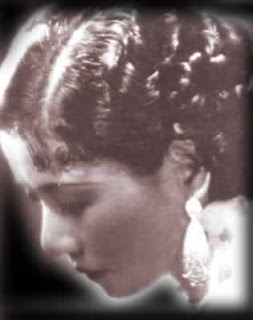http://therapsheet.blogspot.com/2010/02/narrowing-field.html
http://billcrider.blogspot.com/2010/02/i-blame-myself-for-this.html
Blogging is an awful lot like real journalism, when practiced well.....like so many other activities requiring talent and commitment, it will eventually become a smaller enterprise, in this case engaged in by people who are serious about having their say--at some length--in the world.
I like blogging because I think it's the contemporary equivalent of 18th century broadsides -- very immediate, very democratic, and you can use it for anything. But, as a professor quoted in the AP article says, the form does take time and effort. Texting and Twitter have become popular because they don't. I acknowledge that a well-turned tweet might be remotely akin to a haiku -- but even Asian poets have never written in haiku exclusively!
The death of attention, focus, and concentration is very troubling to me. You see it everywhere. Fortunately, the Internet can be used to help create a true counter-culture that still values those qualities, without rejecting the benefits of modern innovations. We should not let technology dictate to us; we should dictate to it. We have to decide whether we are still the masters, or whether our cell phones are.
BBC 4, a bastion of intelligence in a fallen world, is putting on an ambitious series of programs by Mark Lawson, Capturing America, a radio history of modern American literature featuring many interviews with out great writers of the second half of the 20th century -- Morrison, Roth, Updike, Vonnegut, Oates. The full-length interviews excerpted in the programs are all permanently available on an "American Authors" page:
http://www.bbc.co.uk/programmes/b00qj2pf
http://www.bbc.co.uk/radio4/features/front-row/american-authors/
http://americanfiction.wordpress.com/2010/02/10/the-bbcs-american-archive/
British novelist David Peace, currently getting plenty of attention for the telefilm adaptation of his Red Riding Quartet as the Red Riding Trilogy, posted a very interesting "Literary Top Ten" at Pulp.net:
http://www.pulp.net/58/top10.html
The author of Tokyo Year Zero has a special appreciation of Japanese culture. I like his citation of Yumeno Kyusaku, who according to Wikipedia "exemplifies modern Japanese avant-garde gothic literature," but has apparently not yet been translated into English:
http://en.wikipedia.org/wiki/Yumeno_Ky%C5%ABsaku
This is the "Exploded House" in Bodrum, Turkey, designed by Global Architectural Development (GAD):
http://www.archdaily.com/49556/exploded-house-gad/
http://en.wikipedia.org/wiki/Bodrum
The National Gallery of Canada has mounted an exhibition of the work of an imaginative photographer/artist, Nicolas Baier, "whose subjects include antique mirrors, the surface of polished stone, and water-stained paper":
http://www.artdaily.org/index.asp?int_sec=11&int_new=36236
http://nicolasbaier.com/
The Latin Americanist provides an interesting update on the Argentine desaparecidos, the "disappeared" of the Dirty war of the late Seventies and early Eighties:
http://ourlatinamerica.blogspot.com/2010/02/argentinas-disappeared-30-years-later.html
The European literary world is a-twitter over a six-volume, 3,000-page Norwegian novel by Karl Ove Knausgard cheekily titled Min Kamp (the Norwegian equivalent of Mein Kampf -- "My Struggle" in English) and described as "obsessive" (you think?):
http://www.rochester.edu/College/translation/threepercent/index.php?id=2506
Devotees of Stanley Kwan's great 1992 film Actress, about the Chinese silent film star Ruan Lingyu (one of the most beautiful women ever to grace the screen), will be pleased to know that one of her surviving features, The Goddess, is now available on DVD with a 94-page book about her by Professor Richard J. Meyer:
http://www.coffeecoffeeandmorecoffee.com/archives/2010/02/the_goddess.html

Among notables born on this date are film directors Sam Peckinpah, Sacha Guitry, and Margarethe von Trotta, diarist Anais Nin, guitarist Andres Segovia, novelists David Foster Wallace, Chuck Palahniuk, Clemence Dane, Ha Jin, Karel Capek-Chod (Czech Republic), Waldemar Bonsels (Germany), and Raymond Queneau (France), theologian John Henry Newman, poet W.H. Auden, composers Carl Czerny, Leo Delibes, and Charles Marie Widor, Congresswoman Barbara Jordan, philosopher John Rawls, singer Nina Simone, and actors Tyne Daly, Gary Lockwood, William Petersen, Kelsey Grammer, Rue McClanahan, and Alan Rickman.
Rather than fumble with my own words to pay tribute to W.H. Auden, let me just go all "Writer's Almanac" and give his poem "The More Loving One":
Looking up at the stars, I know quite well
That, for all they care, I can go to hell,
But on earth indifference is the least
We have to dread from man or beast.
How should we like it were stars to burn
With a passion for us we could not return?
If equal affection cannot be,
Let the more loving one be me.
Admirer as I think I am
Of stars that do not give a damn,
I cannot, now I see them, say
I missed one terribly all day.
Were all stars to disappear or die,
I should learn to look at an empty sky
And feel its total dark sublime,
Though this might take me a little time.

No comments:
Post a Comment